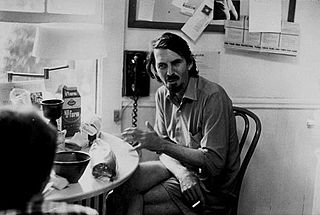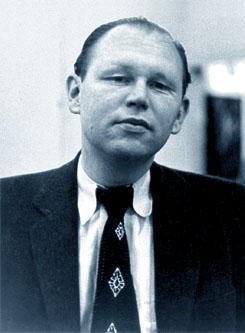Life
Gizzi was born in Alma, Michigan to an Italian American family. [1] He spent most of his childhood and adolescence in Pittsfield, Massachusetts. Gizzi has said that he "internalized the hierarchy of music over words as a kid at Catholic mass, where the liturgy was often in Latin". [2] After graduating from high school, the poet delayed going to college and took a job in a factory winding resin tubes and in a residential treatment center working with emotionally disturbed adolescents. Working overnight at the treatment center, Gizzi read George Oppen's Collected Poems, along with H.D., Wallace Stevens, William Carlos Williams, Federico García Lorca, Baudelaire, Rimbaud "and almost anything published by Burning Deck." Living in New York City, in part to keep in touch with the punk scene, he walked by the St. Mark's book store one day and his eye was caught by a reprinted version of BLAST , with its shocking pink and diagonal title. He picked up a copy and read the manifestos. "I was home in that synthesis — Punk and Poetry had merged and I knew at once I wanted to edit my own journal and so I did," he later wrote. [3]
By the late 1980s, he was waiting tables, reading and editing o•blék: a journal of language arts , [3] which he founded in 1987 with Connell McGrath.
In 1991, he started editing the lectures of Jack Spicer for publication and went to SUNY Buffalo with support from Robert Creeley, Charles Bernstein, and Susan Howe, "and with the financial support (meager as it was) that working within an institution offered." [3] In 1993, after eight years and 12 issues, he left o•blék , which soon folded.
Gizzi has taught at Brown University and The University of California, Santa Cruz. Since 2001, he has been a professor in the MFA Program for Poets & Writers at The University of Massachusetts Amherst. For several years, he was poetry editor at The Nation . He also is on the contributing editorial board to the literary journal Conjunctions . He is the brother of deceased poet Michael Gizzi.
Poetry
In 1992 Peter Gizzi published his first full-length collection, "Periplum" which won praise from critics. [4] This was followed by "Artificial Heart", a collection which enhanced Gizzi's reputation as a lyric poet writing as a modern troubadour in a style which is allusive and oblique. [5]
In 2003, "Some Values of Landscape and Weather" was published. The title poem of this collection is "a sustained examination of the relationship between public and private spaces, as well as a complex reflection on war". [6]
The collection "The Outernationale" (2007) investigates language, knowledge and experience but combines this with an implied political stance. [7]
"Threshold Songs" (2011) is a series of poetic elegies which also investigate the role of the lyric poet and show "the voice of the poet contemplating its relation to other voices". [8]
Gizzi's most recent collection, "Archeophonics", continues his investigation of language; the title of the book refers to the excavation of lost sounds analogous to the process of archeology. [4]

Robert White Creeley was an American poet and author of more than sixty books. He is usually associated with the Black Mountain poets, though his verse aesthetic diverged from that school. He was close with Charles Olson, Robert Duncan, Allen Ginsberg, John Wieners and Ed Dorn. He served as the Samuel P. Capen Professor of Poetry and the Humanities at State University of New York at Buffalo. In 1991, he joined colleagues Susan Howe, Charles Bernstein, Raymond Federman, Robert Bertholf, and Dennis Tedlock in founding the Poetics Program at Buffalo. Creeley lived in Waldoboro, Buffalo, and Providence, where he taught at Brown University. He was a recipient of the Lannan Foundation Lifetime Achievement Award.

John Lawrence Ashbery was an American poet and art critic.
The Language poets are an avant-garde group or tendency in United States poetry that emerged in the late 1960s and early 1970s. The poets included: Bernadette Mayer, Leslie Scalapino, Stephen Rodefer, Bruce Andrews, Charles Bernstein, Ron Silliman, Barrett Watten, Lyn Hejinian, Tom Mandel, Bob Perelman, Rae Armantrout, Alan Davies, Carla Harryman, Clark Coolidge, Hannah Weiner, Susan Howe, James Sherry, and Tina Darragh.

Jack Spicer was an American poet often identified with the San Francisco Renaissance. In 2009, My Vocabulary Did This to Me: The Collected Poetry of Jack Spicer won the American Book Award for poetry. He spent most of his writing-life in San Francisco.

Bernard Keith Waldrop was an American poet, translator, publisher, and academic. He won the National Book Award for Poetry for his 2009 collection Transcendental Studies: A Trilogy.

Barbara Guest, néeBarbara Ann Pinson, was an American poet and prose stylist. Guest first gained recognition as a member of the first generation New York School of poetry. Guest wrote more than 15 books of poetry spanning sixty years of writing. In 1999, she was awarded the Frost Medal for Lifetime Achievement by the Poetry Society of America. Guest also wrote art criticism, essays, and plays. Her collages appeared on the covers of several of her books of poetry. She was also well known for her biography of the poet H.D., Herself Defined: The Poet H.D. and Her World (1984).

Anne Stevenson was an American-British poet and writer and recipient of a Lannan Literary Award.

Rachel Blau DuPlessis is an American poet and essayist, known as a feminist critic and scholar with a special interest in modernist and contemporary poetry. Her work has been widely anthologized.

Juliana Spahr is an American poet, critic, and editor. She is the recipient of the 2009 Hardison Poetry Prize awarded by the Folger Shakespeare Library to honor a U.S. poet whose art and teaching demonstrate great imagination and daring.
The Collected Books of Jack Spicer first appeared in 1975, ten years after the death of Jack Spicer. It was "edited & with a commentary by Robin Blaser" and published in Santa Rosa, California by Black Sparrow Press. A primary document of the San Francisco Renaissance, The Collected Books of Jack Spicer has arguably reached the status of a twentieth century "classic" and helped to define an emerging countertradition to the prevailing literary establishment. Since this edition has gone out of print, it has been updated, revised and republished as My Vocabulary Did This To Me. The Collected Poetry of Jack Spicer, Edited by Peter Gizzi and Kevin Killian.
William Corbett was an American poet, essayist, editor, educator, and publisher.
Rachel Hadas is an American poet, teacher, essayist, and translator. Her most recent essay collection is Piece by Piece: Selected Prose, and her most recent poetry collection is Love and Dread. Her honors include a Guggenheim Fellowship, Ingram Merrill Foundation Grants, the O.B. Hardison Award from the Folger Shakespeare Library, and an Award in Literature from the American Academy and Institute of Arts and Letters.

Stephen Rodefer was an American poet and painter who lived in Paris and London. Born in Bellaire, Ohio, he knew many of the early beat and Black Mountain poets, including Allen Ginsberg, Gregory Corso, Charles Olson, and Robert Creeley. Rodefer was one of the original Language poets and taught widely, including: UNM, SUNY Buffalo, UC Berkeley, UC San Diego, San Francisco State, and the American University of Paris. Rodefer was the first American poet to be offered a Fellowship at Cambridge University.
Andrew Zawacki is an American poet, critic, editor, and translator. He was a 2016 Howard Foundation Fellow in Poetry.
o•blék: a journal of language arts was a small literary magazine founded by Peter Gizzi who co-edited it with Connell McGrath. The magazine published a number of poems often not in the mainstream but recognized for their excellence. The magazine ran from 1987 to 1993.
Rod Smith is an American poet, editor and publisher.

Heather McHugh is an American poet notable for the independent ranges of her aesthetic as a poet, and for her working devotion to teaching and translating literature.
Drew Milne is a contemporary British poet and academic.
Tony Lopez is an English poet who first began to be published in the 1970s. His writing was at once recognised for its attention to language, and for his ability to compose a coherent book, rather than a number of poems accidentally printed together. He is best known for his book False Memory, first published in the United States and much anthologised.
David Chaloner was an English poet associated with the British Poetry Revival, and a prominent British designer.










